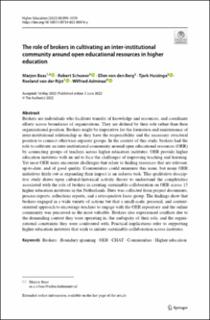| dc.contributor.author | Baas, Marjon | |
| dc.contributor.author | Schuwer, Robert | |
| dc.contributor.author | van den Berg, Ellen | |
| dc.contributor.author | Huizinga, Tjark | |
| dc.contributor.author | van der Rijst, Roeland | |
| dc.contributor.author | Admiraal, Wilfried | |
| dc.date.accessioned | 2023-07-07T06:59:28Z | |
| dc.date.available | 2023-07-07T06:59:28Z | |
| dc.date.created | 2022-09-08T12:15:17Z | |
| dc.date.issued | 2022 | |
| dc.identifier.citation | Higher Education. 2022, 85 (5), 999-1019. | en_US |
| dc.identifier.issn | 0018-1560 | |
| dc.identifier.uri | https://hdl.handle.net/11250/3077018 | |
| dc.description.abstract | Brokers are individuals who facilitate transfer of knowledge and resources, and coordinate efforts across boundaries of organizations. They are defined by their role rather than their organizational position. Brokers might be imperative for the formation and maintenance of inter-institutional relationship as they have the responsibility and the necessary structural position to connect otherwise separate groups. In the context of this study, brokers had the role to cultivate an inter-institutional community around open educational resources (OER) by connecting groups of teachers across higher education institutes. OER provide higher education institutes with an aid to face the challenges of improving teaching and learning. Yet most OER users encounter challenges that relate to finding resources that are relevant, up-to-date, and of good quality. Communities could minimize this issue, but many OER initiatives fizzle out as expanding their impact is an arduous task. This qualitative descriptive study draws upon cultural-historical activity theory to understand the complexities associated with the role of brokers in creating sustainable collaboration on OER across 15 higher education institutes in the Netherlands. Data was collected from project documents, process reports, reflections reports, and a retrospective focus group. The findings show that brokers engaged in a wide variety of actions but that a small-scale, personal, and content-oriented approach to encourage teachers to engage with the OER repository and the online community was perceived as the most valuable. Brokers also experienced conflicts due to the demanding context they were operating in, the ambiguity of their role, and the organizational constraints they were confronted with. Practical implications refer to supporting higher education institutes that wish to initiate sustainable collaboration across institutes. | en_US |
| dc.language.iso | eng | en_US |
| dc.rights | Navngivelse 4.0 Internasjonal | * |
| dc.rights.uri | http://creativecommons.org/licenses/by/4.0/deed.no | * |
| dc.title | The role of brokers in cultivating an inter-institutional community around open educational resources in higher education | en_US |
| dc.type | Peer reviewed | en_US |
| dc.type | Journal article | en_US |
| dc.description.version | publishedVersion | en_US |
| cristin.ispublished | true | |
| cristin.fulltext | original | |
| cristin.fulltext | original | |
| cristin.qualitycode | 2 | |
| dc.identifier.doi | 10.1007/s10734-022-00876-y | |
| dc.identifier.cristin | 2049883 | |
| dc.source.journal | Higher Education | en_US |
| dc.source.volume | 85 | en_US |
| dc.source.issue | 5 | en_US |
| dc.source.pagenumber | 999-1019 | en_US |

